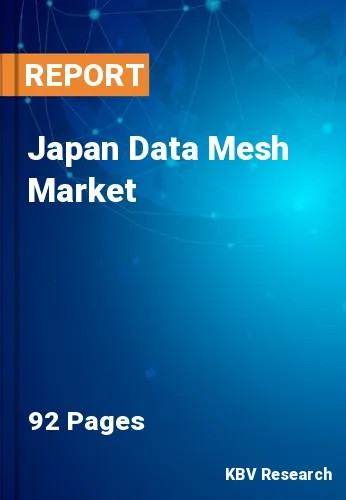Chapter 1. Market Scope & Methodology
1.1 Market Definition
1.2 Objectives
1.3 Market Scope
1.4 Segmentation
1.4.1 Japan Data Mesh Market, by Offering
1.4.2 Japan Data Mesh Market, by Approach
1.4.3 Japan Data Mesh Market, by Application
1.4.4 Japan Data Mesh Market, by Business Function
1.4.5 Japan Data Mesh Market, by Vertical
1.5 Methodology for the research
Chapter 2. Market Overview
2.1 Introduction
2.1.1 Overview
2.1.1.1 Market Composition and Scenario
2.2 Key Factors Impacting the Market
2.2.1 Market Drivers
2.2.2 Market Opportunities
2.2.3 Market Restraints
2.2.4 Market Challenges
2.2.5 Market Trends
Chapter 3. Competition Analysis - Global
3.1 KBV Cardinal Matrix
3.2 Recent Industry Wide Strategic Developments
3.2.1 Partnerships, Collaborations and Agreements
3.2.2 Product Launches and Product Expansions
3.2.3 Acquisition and Mergers
3.3 Market Share Analysis, 2022
3.4 Top Winning Strategies
3.4.1 Key Leading Strategies: Percentage Distribution (2019-2023)
3.4.2 Key Strategic Move: (Partnerships, Collaborations & Agreements: 2019, Jun – 2023, Dec) Leading Players
3.5 Porter Five Forces Analysis
Chapter 4. Japan Data Mesh Market
4.1 Japan Data Mesh Market by Offering
4.1.1 Japan Data Mesh Market by Solution Deployment Type
4.1.2 Japan Data Mesh Market by Solution Type
4.2 Japan Data Mesh Market by Approach
4.3 Japan Data Mesh Market by Application
4.4 Japan Data Mesh Market by Business Function
4.5 Japan Data Mesh Market by Vertical
Chapter 5. Company Profiles – Global Leaders
5.1 Monte Carlo Data, Inc.
5.1.1 Company Overview
5.1.2 Recent strategies and developments:
5.1.2.1 Partnerships, Collaborations, and Agreements:
5.1.2.2 Product Launches and Product Expansions:
5.2 Nexla, Inc.
5.2.1 Company Overview
5.3 IBM Corporation
5.3.1 Company Overview
5.3.2 Financial Analysis
5.3.3 Regional & Segmental Analysis
5.3.4 Research & Development Expenses
5.3.5 Recent strategies and developments:
5.3.5.1 Partnerships, Collaborations, and Agreements:
5.3.5.2 Product Launches and Product Expansions:
5.3.5.3 Acquisition and Mergers:
5.3.6 SWOT Analysis
5.4 Amazon Web Services, Inc. (Amazon.com, Inc.)
5.4.1 Company Overview
5.4.2 Financial Analysis
5.4.3 Segmental Analysis
5.4.4 Recent strategies and developments:
5.4.4.1 Product Launches and Product Expansions:
5.4.5 SWOT Analysis
5.5 SAP SE
5.5.1 Company Overview
5.5.2 Financial Analysis
5.5.3 Segmental and Regional Analysis
5.5.4 Research & Development Expense
5.5.5 SWOT Analysis
5.6 Oracle Corporation
5.6.1 Company Overview
5.6.2 Financial Analysis
5.6.3 Segmental and Regional Analysis
5.6.4 Research & Development Expense
5.6.5 Recent strategies and developments:
5.6.5.1 Partnerships, Collaborations, and Agreements:
5.6.5.2 Product Launches and Product Expansions:
5.6.6 SWOT Analysis
5.7 Informatica Inc.
5.7.1 Company Overview
5.7.2 Financial Analysis
5.7.3 Regional Analysis
5.7.4 Research & Development Expenses
5.7.5 Recent strategies and developments:
5.7.5.1 Partnerships, Collaborations, and Agreements:
5.7.5.2 Acquisition and Mergers:
5.7.6 SWOT Analysis
5.8 Teradata Corporation
5.8.1 Company Overview
5.8.2 Financial Analysis
5.8.3 Segmental & Regional Analysis
5.8.4 Research & Development Expense
5.8.5 Recent strategies and developments:
5.8.5.1 Product Launches and Product Expansions:
5.8.6 SWOT Analysis
5.9 Microsoft Corporation
5.9.1 Company Overview
5.9.2 Financial Analysis
5.9.3 Segmental and Regional Analysis
5.9.4 Research & Development Expenses
5.9.5 Recent strategies and developments:
5.9.5.1 Partnerships, Collaborations, and Agreements:
5.9.6 SWOT Analysis

